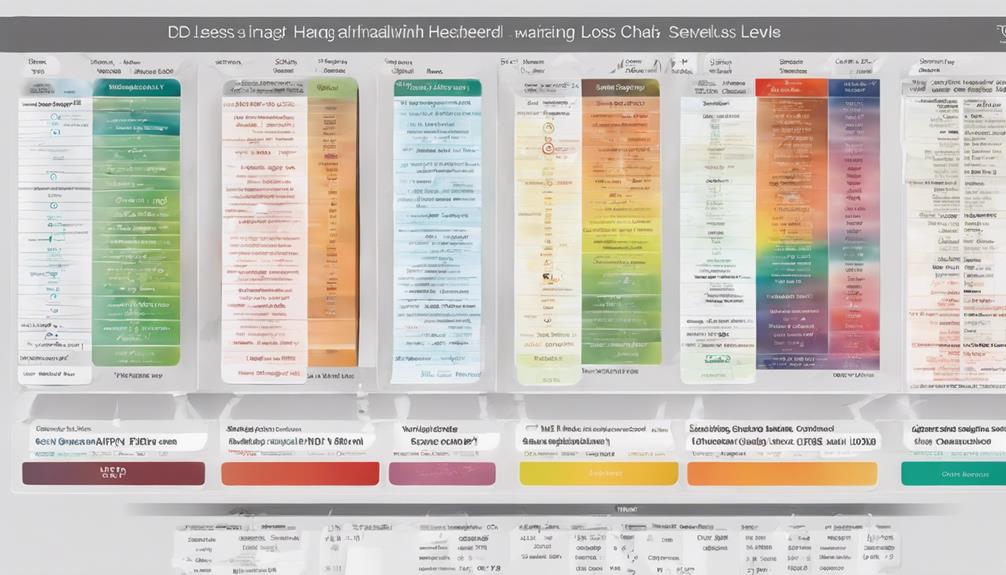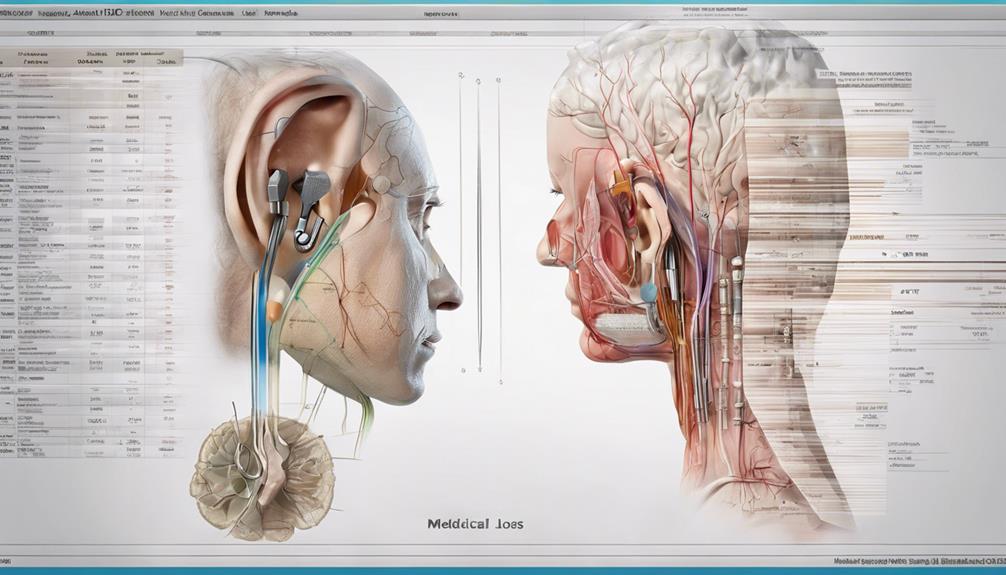Understanding the ICD codes for hearing loss is essential for accurately diagnosing conditions.
The ability to interpret these codes correctly can significantly impact patient care and treatment plans.
By grasping the nuances within these codes, healthcare professionals can enhance their diagnostic capabilities and streamline the billing process for improved patient outcomes.
Key Takeaways
- Precision in ICD coding crucial for accurate diagnosis.
- Coding aids in tailored treatment planning.
- Clear documentation ensures proper billing and reimbursement.
- Understanding coding nuances enhances communication and care coordination.
Importance of ICD Codes in Diagnosis
Understanding the significance of ICD codes in diagnosis is crucial for healthcare providers and institutions striving for precision and efficiency in managing hearing loss cases.
ICD codes, specifically tailored for hearing loss, play a vital role in accurately identifying the type, laterality, and cause of the condition. These codes not only aid in documenting patient information but also ensure clear communication among healthcare providers, leading to more effective treatment plans.
Moreover, proper utilization of ICD codes streamlines the billing process, preventing errors and discrepancies in financial transactions related to hearing loss services.
Deciphering Hearing Loss ICD Codes

Navigating the intricate world of hearing loss ICD codes requires a keen eye for detail and a thorough understanding of the coding system. When deciphering these codes for accurate diagnosis and medical billing, it's essential to consider the nuances of sensorineural and conductive hearing loss.
Here are key points to keep in mind:
- Differentiation: ICD codes distinguish between sensorineural, conductive, and mixed hearing loss in various ears.
- Laterality: New codes introduced in 2017 allow for specifying unilateral (left or right) and bilateral hearing loss.
- Documentation Precision: Proper documentation should clearly indicate the type of hearing loss and laterality for precise diagnosis.
- Billing Importance: Using the correct ICD codes is vital for seamless medical billing processes and ensuring accurate coding.
Common Hearing Loss ICD Codes

Deciphering the complexities of hearing loss ICD codes involves recognizing the significance of common codes utilized for precise diagnosis and billing accuracy. When it comes to coding for hearing loss, understanding the specific ICD-10 codes is essential for accurate reporting. Below is a table outlining some common ICD-10 codes related to hearing loss:
| ICD-10 Code | Description |
|---|---|
| H90.3 | Unspecified sensorineural hearing loss |
| H91.9 | Unspecified hearing loss |
| H90.6 | Mixed conductive and sensorineural hearing loss |
These codes play a vital role in categorizing different types of hearing loss, such as conductive or sensorineural. Additionally, when dealing with bilateral hearing loss, it is important to use the appropriate codes for each side or a single code for bilateral hearing loss, such as H90.43. Proper documentation and correct utilization of these ICD codes are crucial for accurate diagnosis, treatment planning, and reimbursement for audiology services.
Using ICD Codes for Treatment Planning

To effectively plan treatments for patients with hearing loss, utilizing specific ICD codes is crucial for tailoring interventions and monitoring progress accurately. When using ICD codes for treatment planning, consider the following:
- Identifying Type of Hearing Loss: Different ICD codes exist for conductive, sensorineural, and mixed hearing loss, guiding appropriate treatment strategies.
- Specifying Laterality: Codes distinguish between unilateral and bilateral hearing loss, aiding in the customization of interventions based on the affected ear(s).
- Assessing Severity: ICD codes indicate the severity of hearing loss, helping healthcare providers determine the intensity of services required for optimal outcomes.
- Monitoring Audiological Services: Tracking ICD codes over time enables the evaluation of audiologic interventions' effectiveness and the adjustment of treatment plans as needed.
Ensuring Accuracy in ICD Coding

Ensuring the accuracy of ICD coding for hearing loss is paramount in facilitating proper diagnosis and treatment planning processes. Precision in ICD coding allows healthcare providers to document the type and laterality of hearing loss effectively, aiding in tailored treatment strategies.
Moreover, accurate ICD coding is crucial for compliance with coding guidelines and ensuring appropriate reimbursement for services rendered. Detailed clinical documentation plays a pivotal role in selecting the correct ICD code for hearing loss, emphasizing the importance of thorough patient records.
Regular updates and training on ICD-10 coding changes are essential to maintain accuracy in coding for hearing loss and stay abreast of evolving coding practices. By prioritizing accuracy in ICD coding, healthcare professionals can streamline the diagnostic process, enhance treatment planning, and optimize reimbursement outcomes, ultimately improving patient care quality and outcomes.
Frequently Asked Questions
How Do You Know if Hearing Loss Is Sensorineural or Conductive?
We can determine if hearing loss is sensorineural or conductive through audiometric testing. Sensorineural loss results from inner ear or nerve damage, while conductive loss occurs when sound waves can't reach the inner ear.
This testing helps identify the type of hearing loss by assessing how well the inner ear and auditory nerve function. Understanding the specific type of hearing loss is crucial for developing an appropriate treatment plan tailored to the individual's needs.
What Is the Diagnostic Code for Hearing Loss?
Oh, the diagnostic code for hearing loss? Well, let me tell you, it's like finding a needle in a haystack. But fear not, dear reader! With ICD-10's H90-H94 codes, pinpointing those pesky ear disorders becomes a breeze.
From conductive to sensorineural to mixed hearing loss, we've got you covered. And don't even get me started on the new 2017 codes for unilateral and bilateral losses – talk about precision!
Which Diagnostic Test Distinguishes Between Conductive and Sensorineural Hearing Loss?
We can distinguish between conductive and sensorineural hearing loss using the Rinne and Weber tests.
The Rinne test compares air conduction to bone conduction, revealing conductive hearing loss when bone conduction is better.
The Weber test aids in identifying the type of hearing loss based on sound lateralization, with sound moving to the unaffected ear in conductive loss and to the affected ear in sensorineural loss.
What Does H90 3 in Hearing Loss Mean?
When we see the ICD-10 code H90.3 in hearing loss, it points to a mix of sensorineural and central hearing issues in one ear.
This code is crucial for accurately diagnosing these combined types of hearing loss, involving both the inner ear and the auditory nerve.
Understanding H90.3 helps healthcare professionals identify and address the unique challenges presented by this mixed form of hearing impairment.
Conclusion
In conclusion, understanding hearing loss ICD codes is essential for accurate diagnosis and treatment planning.
While some may argue that memorizing these codes is time-consuming, the benefits of precise reporting and improved reimbursement outcomes outweigh the initial effort.
Medical professionals can streamline the diagnostic process and ensure proper care for patients by mastering the nuances of hearing loss ICD coding.










